Looking for camper porch ideas that blend comfort, function, and style? As an expert RV designer, I know that the right porch or deck can dramatically elevate your camping experience. In this honest guide, I’ll share the most effective options for anyone seeking inspiring RV deck ideas—from DIY enthusiasts to full-time travelers.
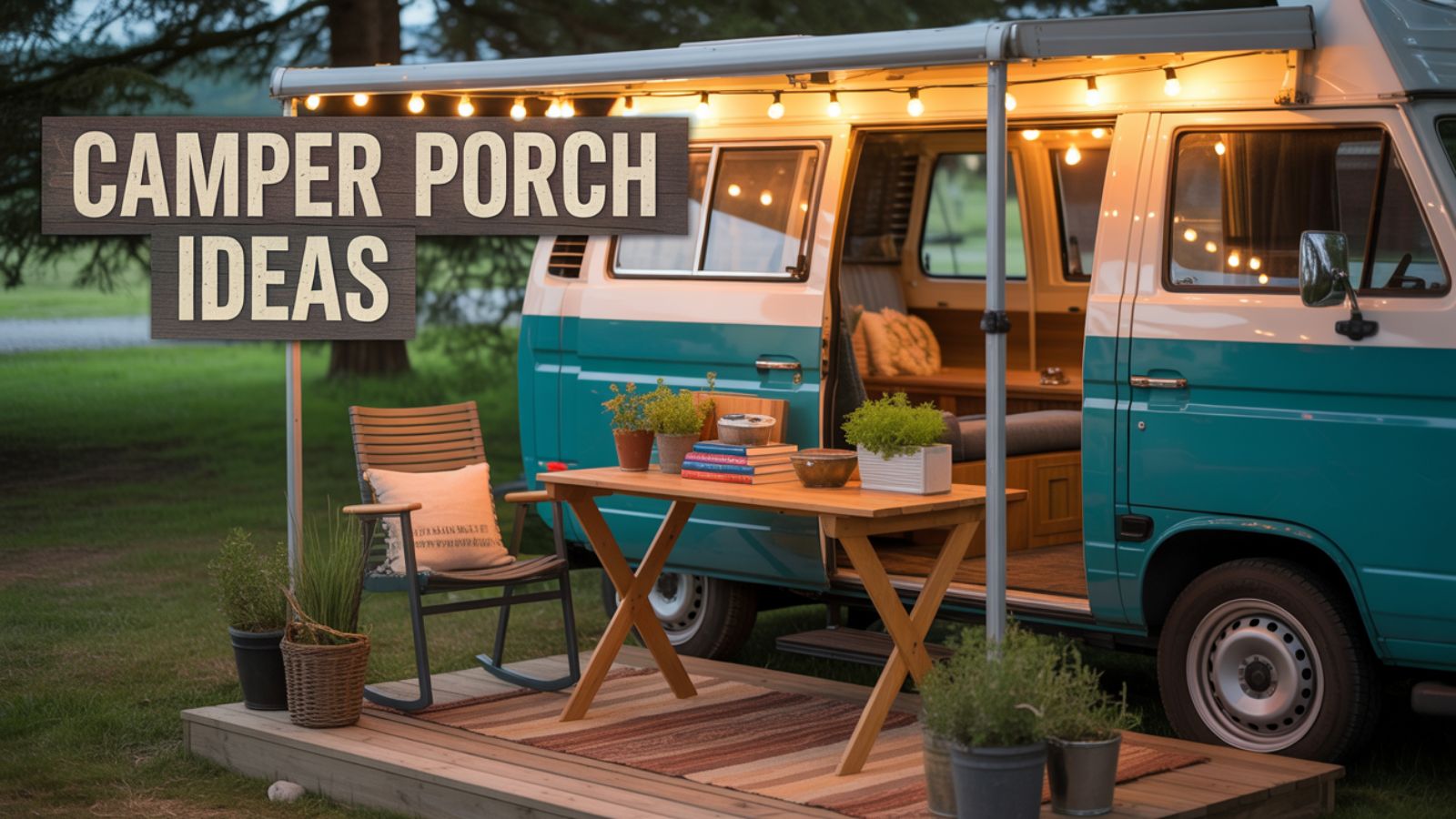
| Porch Type | Cost Range | Difficulty Level | Setup Time | Best For | Portability | Materials Needed |
|---|---|---|---|---|---|---|
| Portable Modular Deck | $800-$2,500 | Easy | 30-60 minutes | Full-time RVers | Fully portable | Pre-made system, no tools |
| Ground-Level Floating Deck | $200-$800 | Medium | 1-2 days | Seasonal campers | Semi-portable | Lumber, deck blocks, screws |
| Multi-Level with Storage | $1,500-$5,000 | Hard | 3-5 days | Permanent sites | Not portable | Lumber, concrete, hardware |
| Screened-In Porch | $1,200-$3,500 | Medium | 2-3 days | Bug-prone areas | Semi-portable | Frame, screening, roof |
| Wrap-Around Deck | $2,000-$8,000 | Hard | 5-7 days | Large RVs, permanent | Not portable | Extensive lumber, foundation |
| DIY Pallet Deck | $50-$200 | Easy | 4-8 hours | Budget-conscious RVers | Portable | Pallets, plywood, fasteners |
| Toy Hauler Conversion | $300-$1,000 | Medium | 1 day | Toy hauler owners | Built-in portable | Non-slip surface, railings |
| Permanent Site Construction | $3,000-$15,000 | Hard | 1-2 weeks | Long-term seasonal | Not portable | Professional materials |
| Portable Steps Platform | $100-$500 | Easy | 1-2 hours | Basic entry improvement | Fully portable | Aluminum/wood, hardware |
| Accessorized Basic Deck | $400-$1,200 | Easy | 2-4 hours | Style-focused RVers | Semi-portable | Basic deck plus furnishings |
1. Portable Modular Deck Systems for Easy Setup
If you want flexibility and fast installation, a portable camper deck system is your best friend. These modular kits snap or screw together in sections, offering campers a solid platform that’s both stylish and sturdy.
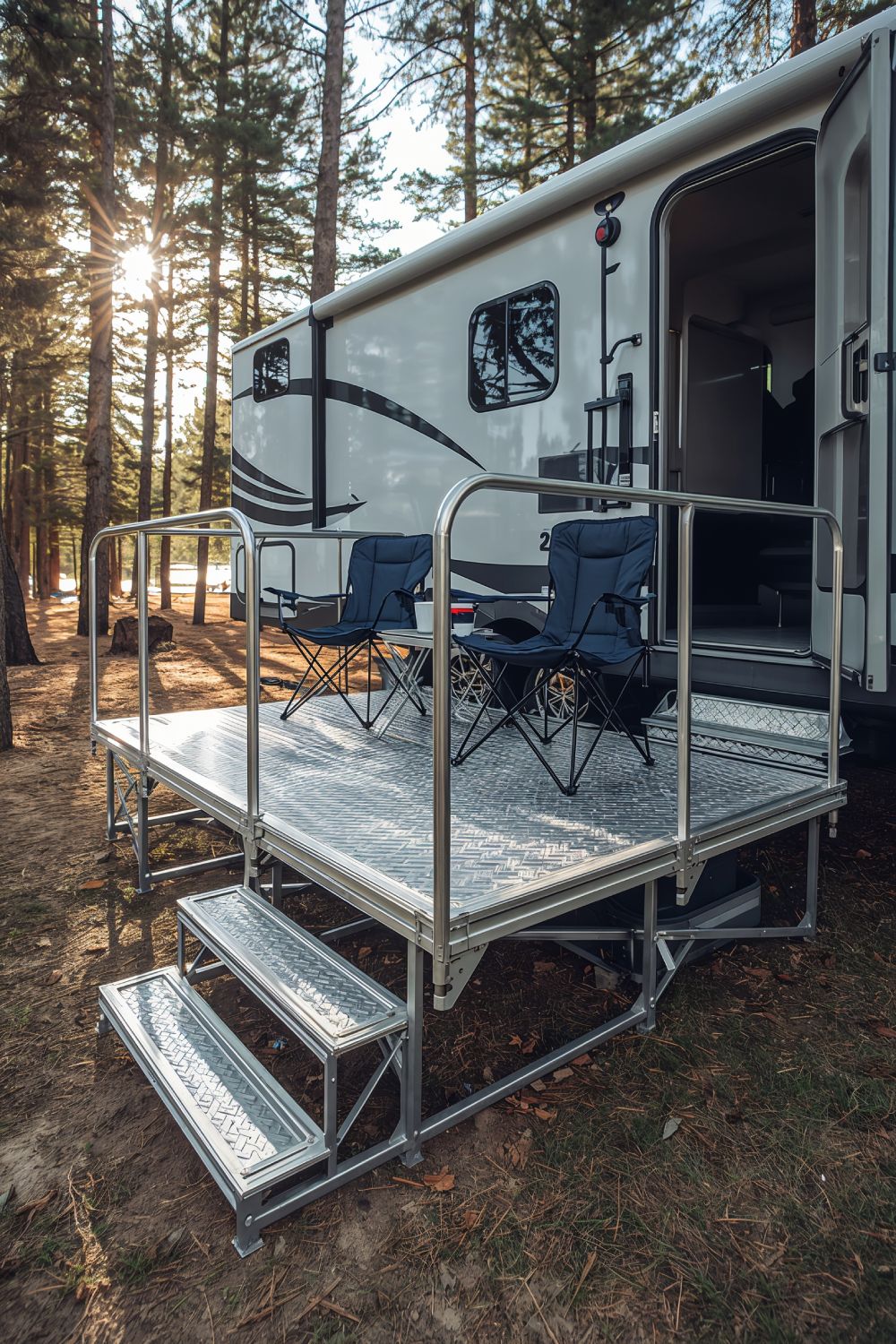
😀 Why it’s important:
Set up in under an hour and break down just as quickly—no tools, no fuss.
How to implement:
- Choose your preferred size and material (aluminum, composite, or weather-treated wood).
- Lay out panels on a flat area beside your RV or camper.
- Connect sections securely per manufacturer instructions.
Best for:
Seasonal campers or frequent travelers who move sites often. The designs are typically lightweight and weather-resistant.
“80% of RV owners say a modular deck makes their campsite feel more like home.” — RV Life Magazine
Drawback:
They’re not as customizable as wood-built decks, and initial purchase can be pricy.
Pro tip:
Look for units with slip-resistant surfaces and drainage channels for rainy days!
2. Ground-Level Floating Deck Designs for Seamless Entry
A ground-level floating deck creates a smooth transition from your camper to your outdoor living area—no steps, no stumbling.
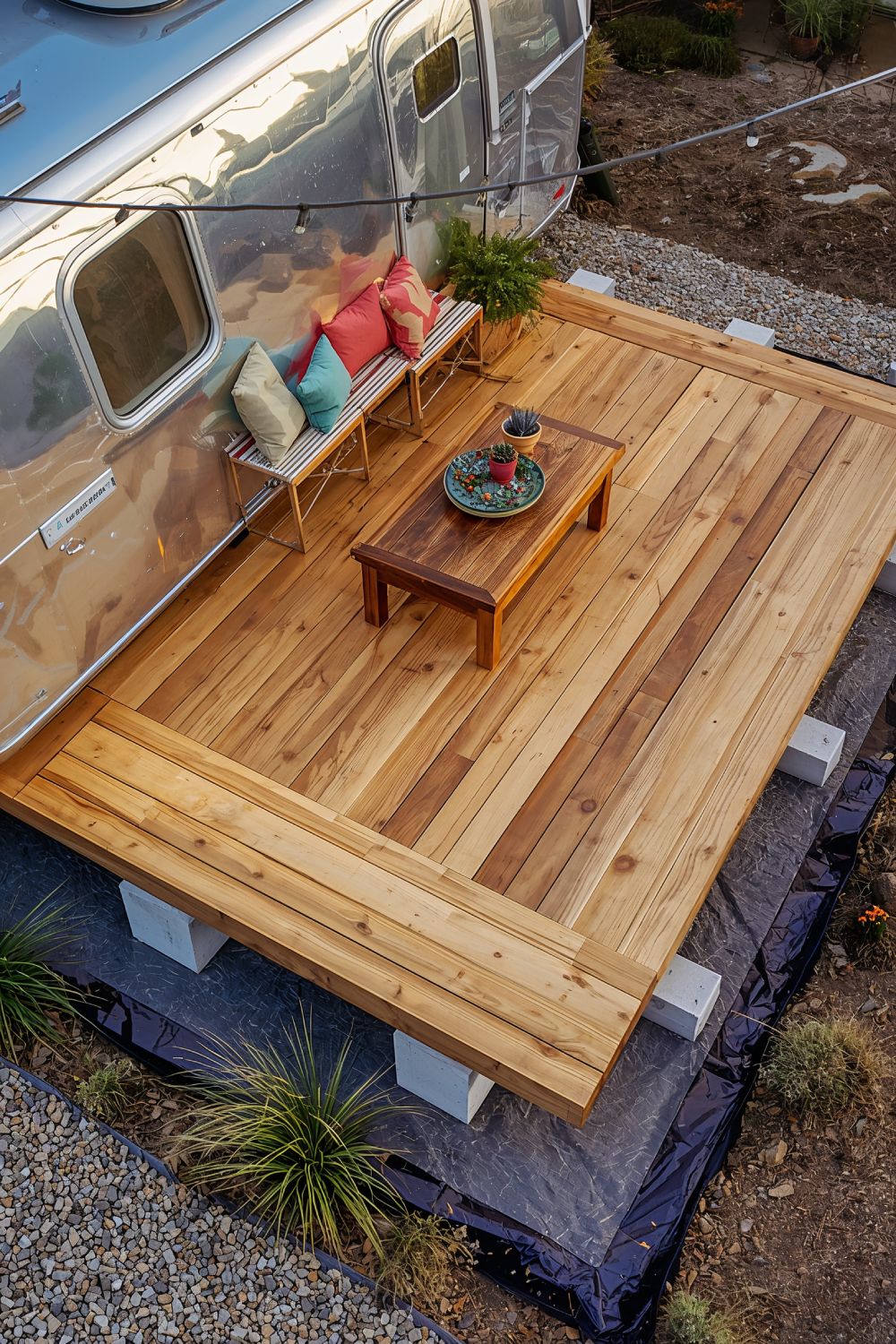
🛠️ How to build one:
- Choose weatherproof decking like composite, cedar, or pressure-treated lumber.
- Level and compact the ground, then lay landscaping fabric.
- Use concrete blocks or deck footings to support frame.
- Attach decking boards, leaving gaps for drainage.
Who it’s best for:
People with mobility issues, families with kids, or anyone who wants a seamless indoor-outdoor transition.
Drawbacks:
Requires a flat site and periodic maintenance. Not ideal for sloped or uneven terrain.
Pro tip:
Stain your floating deck in a natural tone to blend seamlessly with the surrounding campsite!
3. Multi-Level Deck Ideas with Built-in Storage
For those who want to maximize utility, multi-level camper decks with storage are a game changer. You can use stepped platforms to create zones for grilling, lounging, and gear storage.
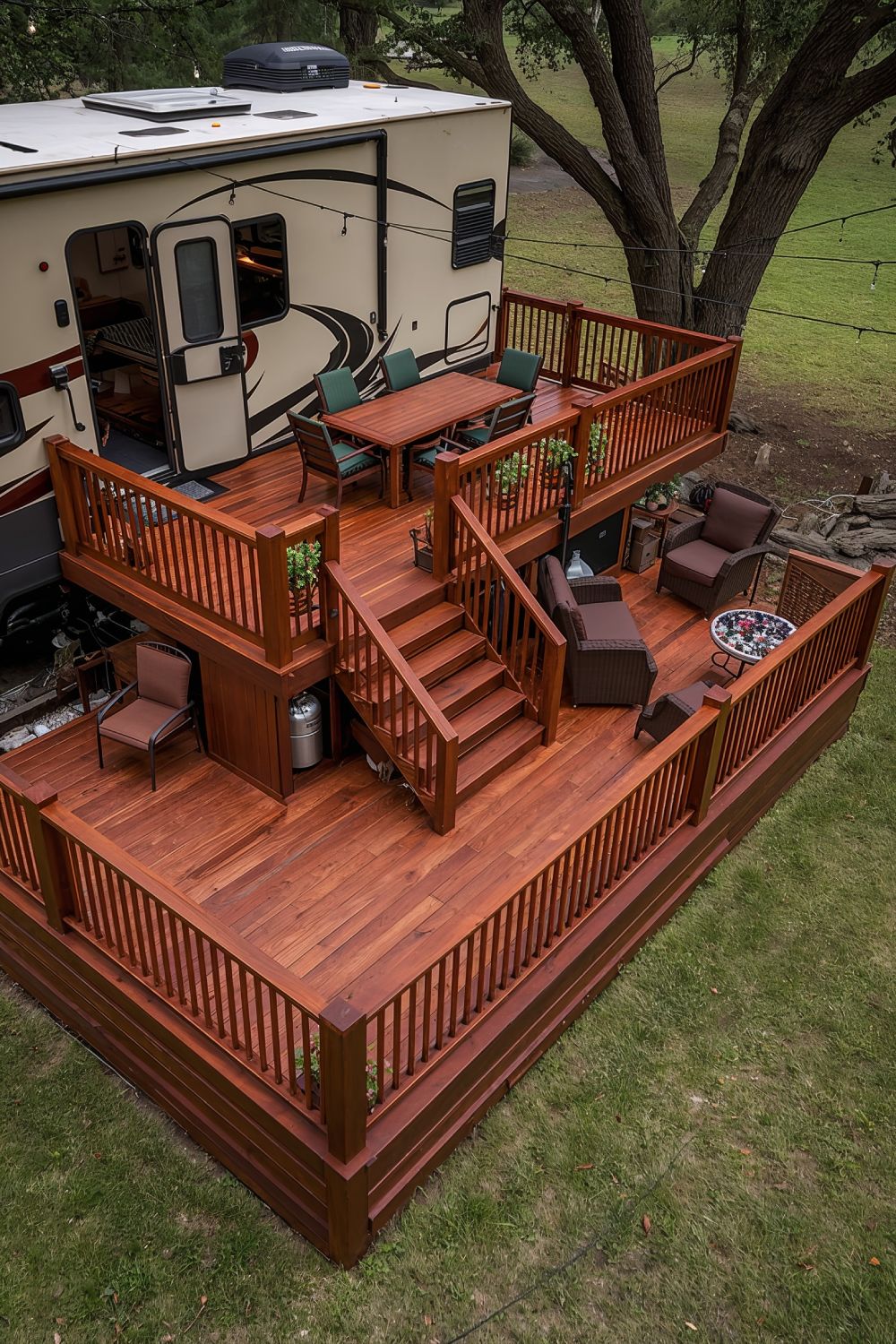
👍 Benefits:
- Keeps gear out of sight and organized
- Adds dimension and visual interest to your site
Styling Tips:
Match stain colors for a cohesive look. Consider built-in benches with flip-up lids for storing hoses or outdoor rugs.
“Integrated storage can double usable floor space in compact RV lots,” notes Brad Smith, Omni Home Ideas.
Cons:
Slightly more complex to build—may need advance carpentry skills or a pro.
4. Screened-In Porch Additions for Bug Protection
Enjoying the outdoors without battling mosquitos? Yes, please! A screened-in RV porch gives you a breezy, pest-free relaxation zone.
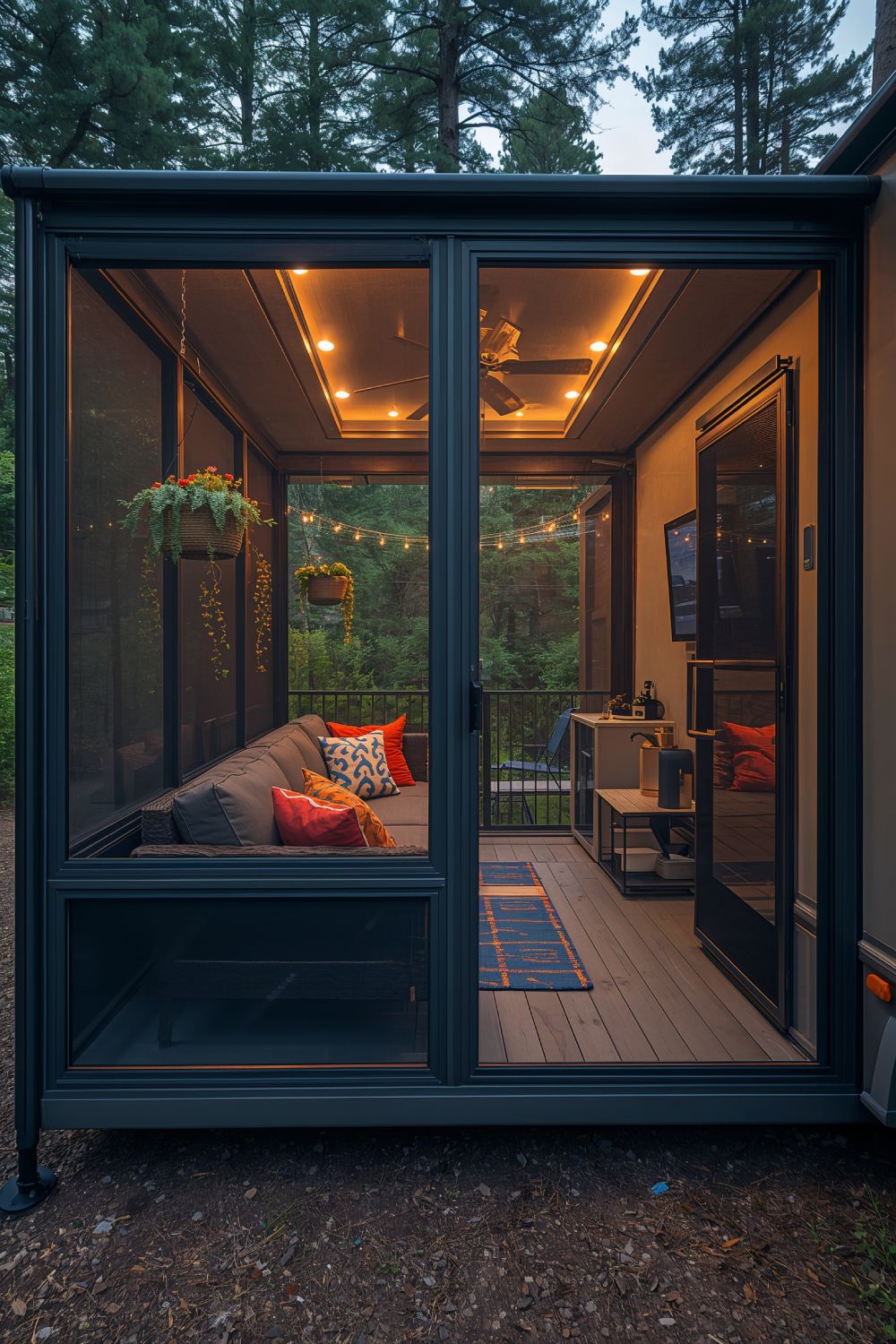
🐞 Why it’s important:
Protects from bugs, debris, and even afternoon showers while you savor meals or a sunset.
How to implement:
- Install a frame using PVC or lightweight wood
- Attach fine mesh screening with easy-entry zippered panels
Best for:
Campers in woodsy or lakeside environments, allergy sufferers, and those wanting extra privacy.
Drawbacks:
May limit airflow compared to fully open decks and requires assembly/disassembly at each move.
Pro tip:
Add magnetic closure strips for hands-free access if you’re juggling food or drinks!
5. Wrap-Around Deck Designs for Maximum Space
A wrap-around camper deck maximizes usable square footage around your RV or travel trailer. Great for those who love to entertain or stretch out.
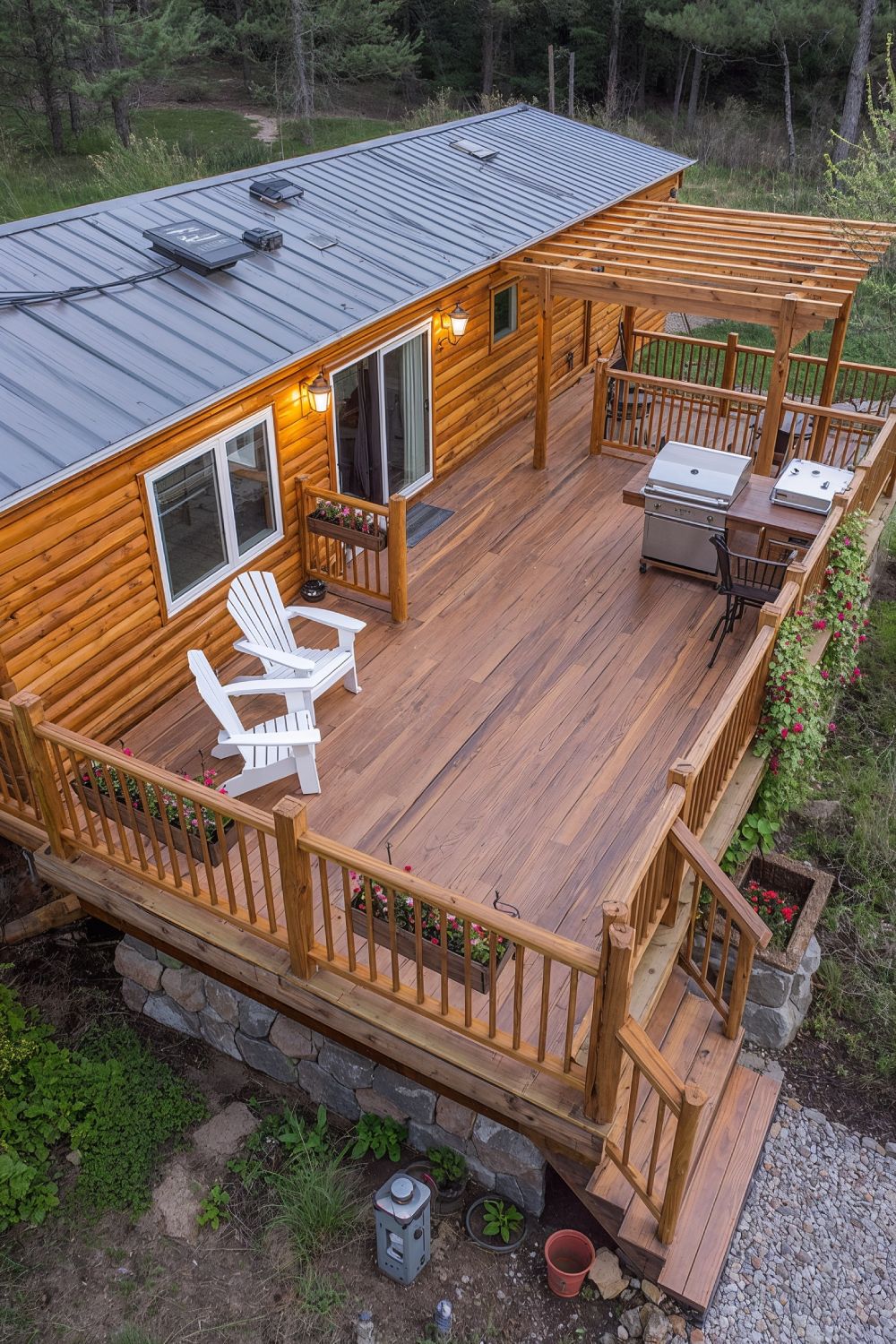
✨ Benefits:
- Room for dining, lounging, and storage—simultaneously!
- Increases curb appeal and resale value for long-term sites
Styling Ideas:
Use modular outdoor rugs, tall planters, or lighting to define “zones.” Wrap decking around slide-outs for a seamless effect.
Drawbacks:
Requires more space and materials—not ideal for cramped RV parks or short-term stays.
“A carefully planned wrap deck turns any camper into a summer retreat.” — Brad Smith
6. DIY Pallet Deck Solutions on a Budget
If you’re watching your wallet, a DIY pallet deck for your RV is clever and resourceful.
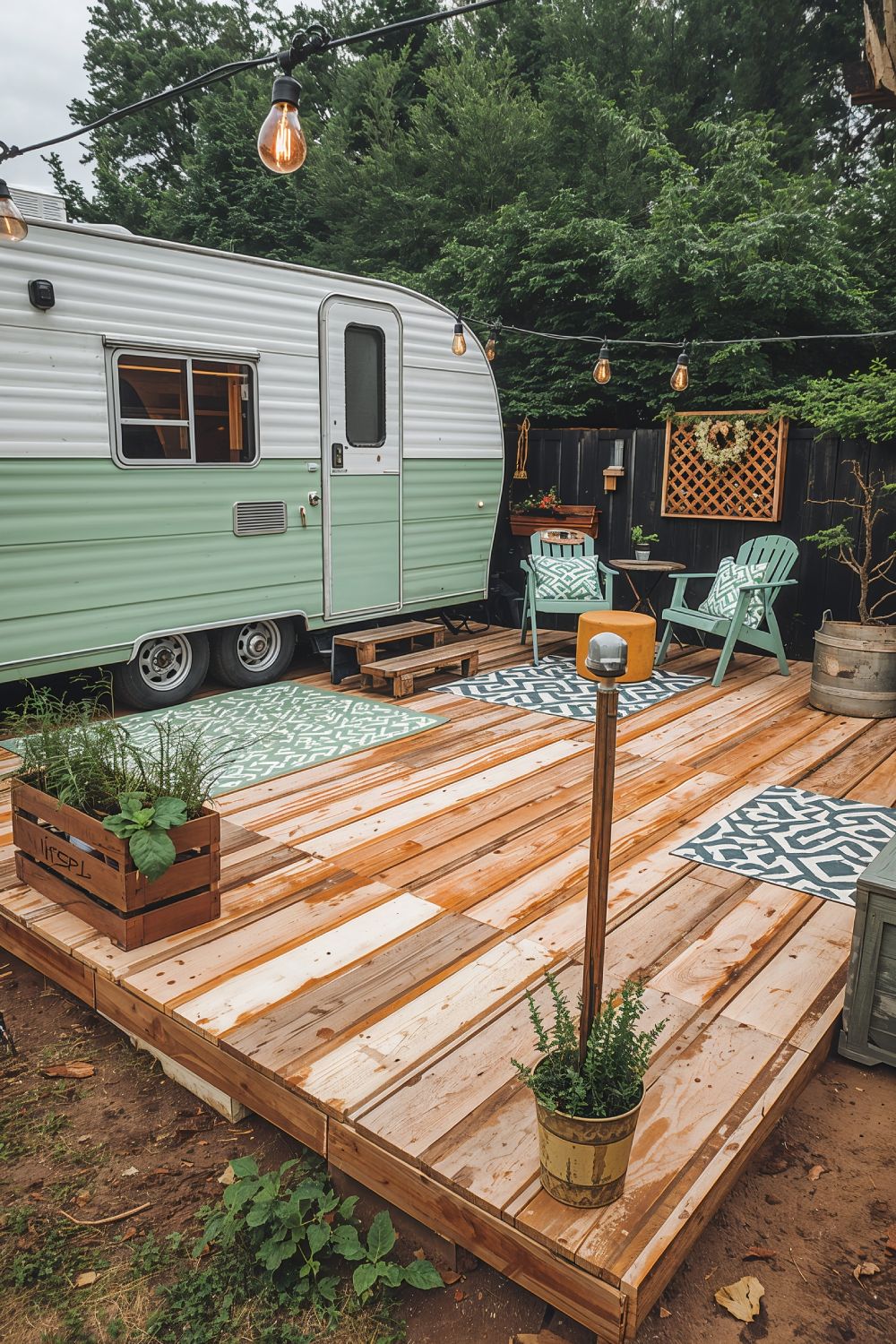
💸 How to do it:
- Source heat-treated pallets (look for “HT” stamp).
- Level and pad your ground with pavers or gravel.
- Lay pallets, connect, and fasten loose boards.
- Sand and paint or seal for weather-resistance.
Best for:
DIYers, seasonal campers, and anyone seeking an eco-friendly solution.
Cons:
Pallets can wear out faster, may not support heavy furniture, and require an even site.
Pro tip:
Layer outdoor rugs or sand down sharp corners for barefoot comfort!
7. Toy Hauler Rear Deck Conversion Ideas
Own a toy hauler? Turn its ramp into a travel trailer deck for instant outdoor square footage.
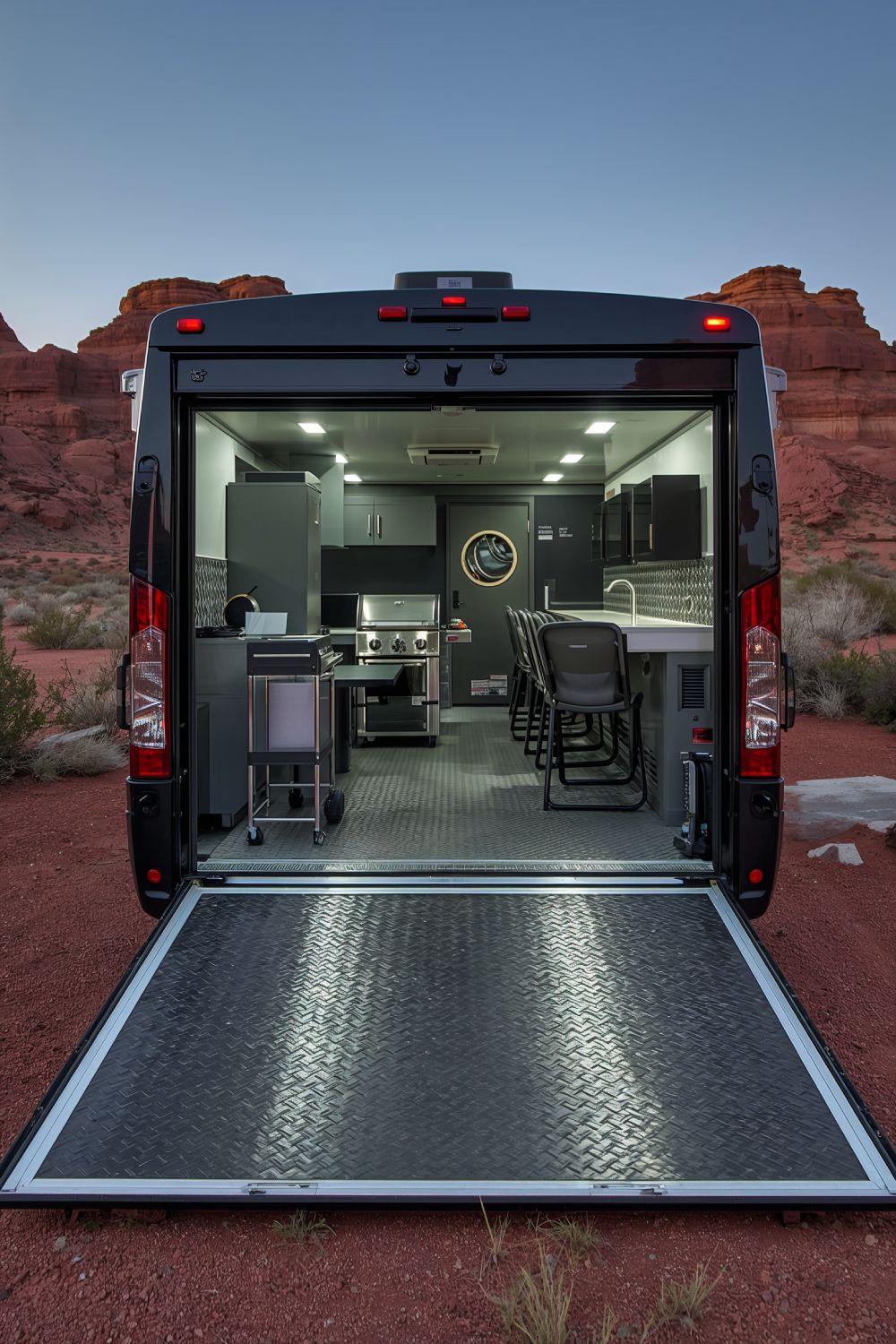
🏍️ Benefits:
- Quickly folds in or out, retaining your cargo function.
- Often includes built-in rails for safety.
Easy upgrades:
- Add a removable screen enclosure, LED strip lighting, or furniture with anchor straps.
Best for:
Adventurers with toys (motorcycles, ATVs) or anyone who wants a flexible party deck.
Drawbacks:
Limited width vs. ground-built decks, and some RV parks may restrict ramp use.
8. Permanent Seasonal Site Deck Construction
If you’ve claimed your favorite spot for the whole summer, a seasonal camper deck offers true home-away-from-home comfort.
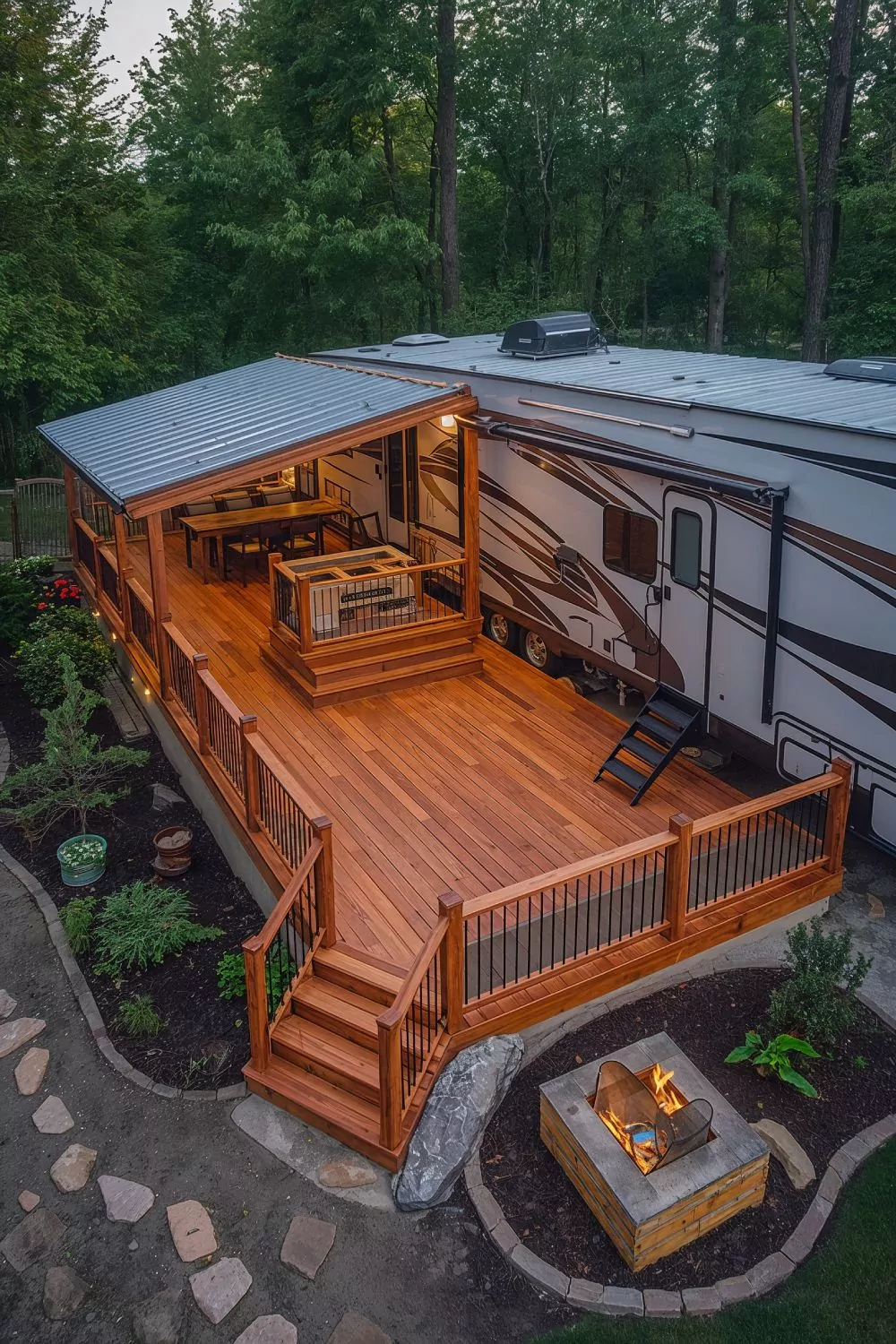
🛠️ Process:
- Check with park management for rules and permits.
- Install sunk or above-ground footings.
- Frame and deck using treated wood for longevity.
- Add railings and stairs for safety and style.
Perfect for:
Long-term campers, retirees, families who park for months at a time.
“Investing in a permanent deck can boost the resale value of your RV by 15% or more.” — RV Investment Guide
Cons:
Not portable—think twice before building if you might move soon.
9. Portable Steps and Entry Platform Options
Not ready for a full deck? Portable steps and entry platforms are smart, simple upgrades.
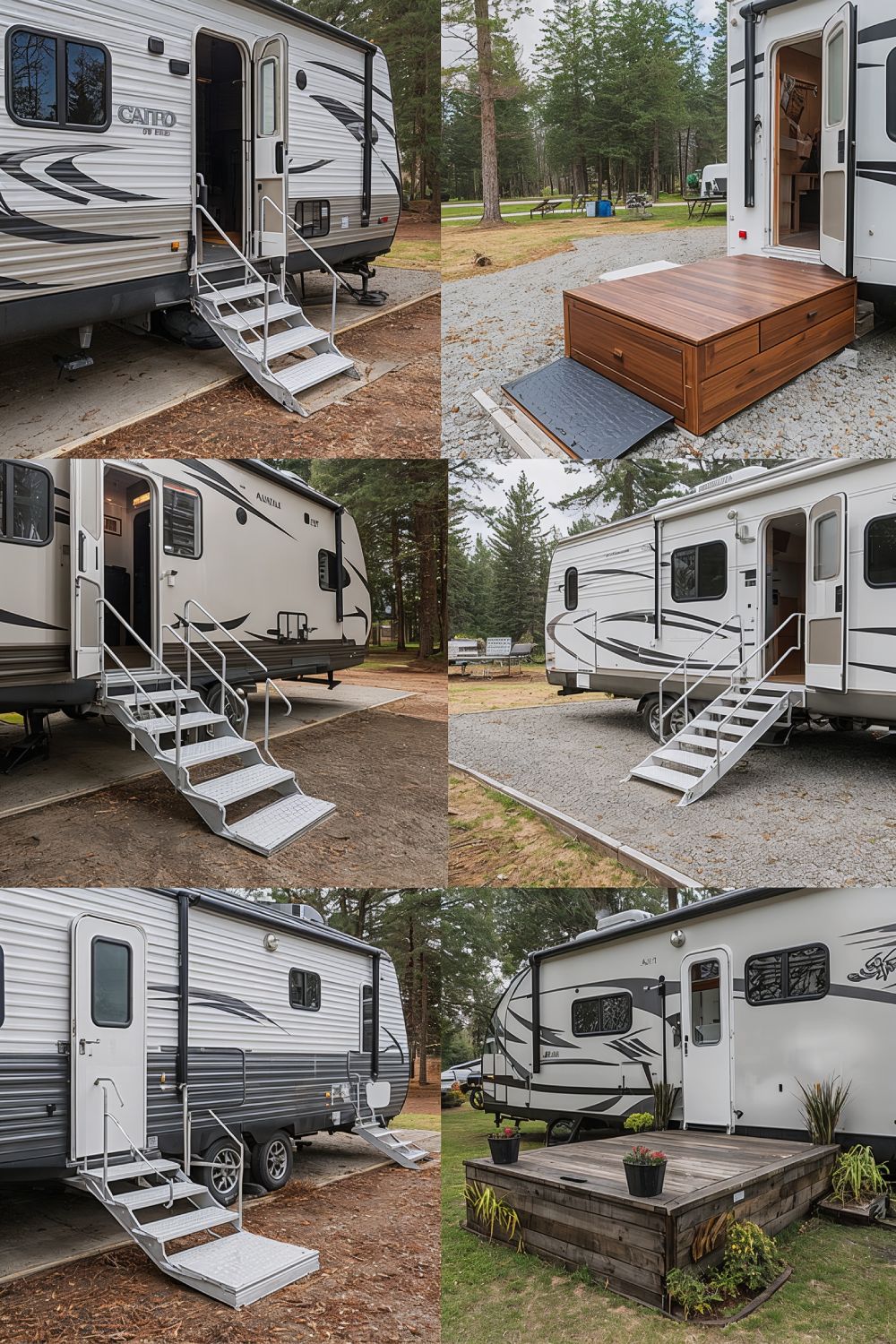
🚶♂️ Benefits:
- Safer, wider, and more stable than factory RV steps
- Easy to move or fold for travel
Install in minutes, and choose from lightweight aluminum, composite, or powder-coated steel.
Best for:
Frequent movers, small trailers, or anyone who wants a no-tools, no-commitment solution.
Drawbacks:
Limited lounging space compared to full decks.
Pro tip:
Choose platforms with adjustable feet for uneven ground stability!
10. Deck Accessories and Furnishing Ideas
Customizing your RV deck with the right finishing touches ensures convenience and style all season long.
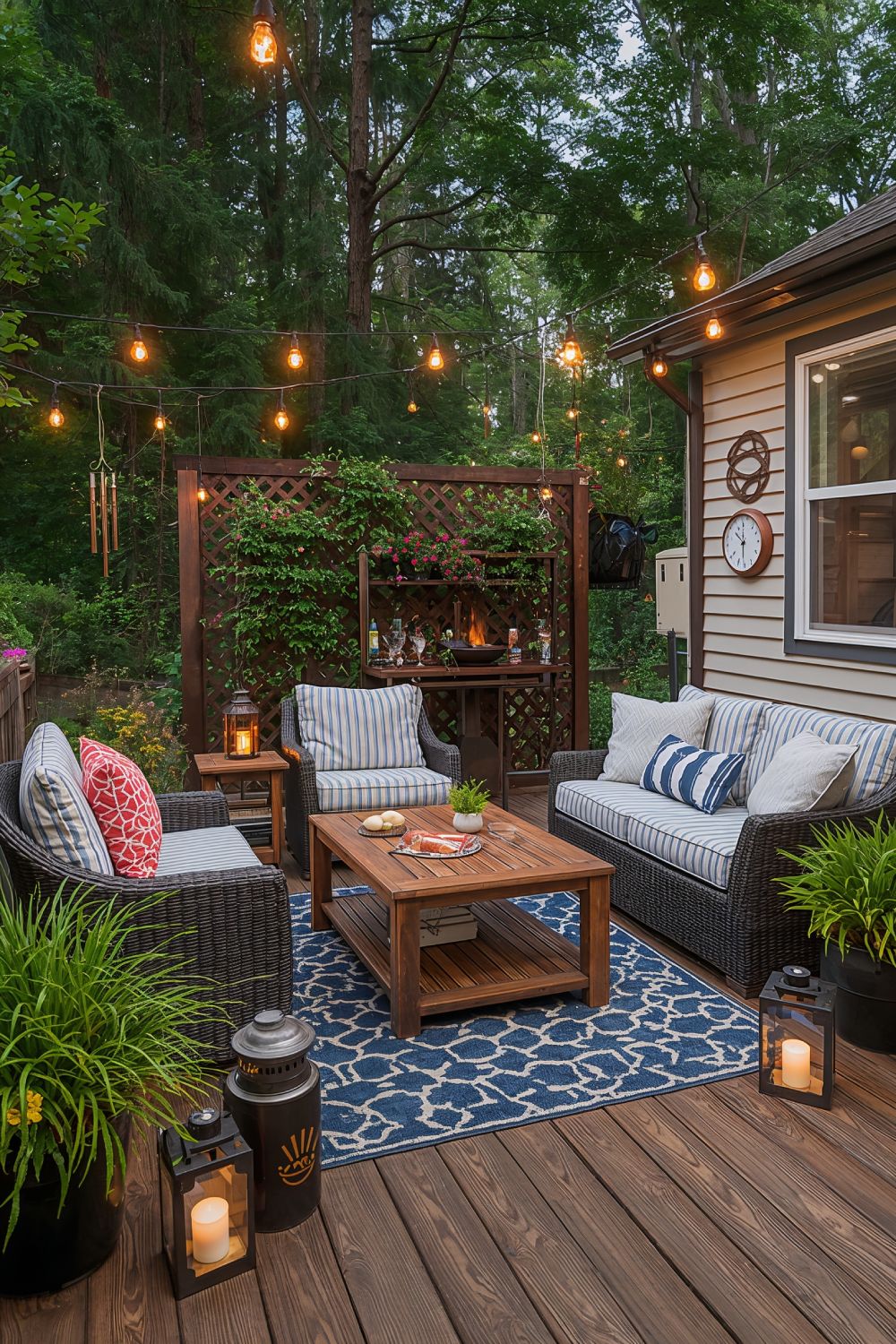
🪑 Popular picks:
- Outdoor rugs or deck tiles
- Weatherproof LED lighting or solar lanterns
- Potted plants or privacy screens
- Collapsible furniture (think benches, tables, or hammocks)
- Retractable awnings for quick shade
Who it’s for:
Everyone! Whether you’re using a simple platform or a full wrap-around deck, accessories make the space yours.
Drawbacks:
Over-accessorizing can clutter the space—edit carefully.
“It’s not about square footage, but ‘wow’ factor—accessorize smartly,” says Brad Smith.
Investing in the right camper porch idea takes your outdoor RV experience from good to unforgettable. Whether you prefer a sleek modular system, a cozy floating deck, or a DIY pallet solution, there’s a functional, stylish option for everyone.
Actionable Tip #1:
Test your deck layout on the ground with string or chalk before building—visualizing saves time and money.
Actionable Tip #2:
Consider weatherproof storage bins beneath your platform to maximize useable space.
Want help turning your vision into reality? Contact us at Omni Home Ideas for a personalized RV porch plan—and make every campsite your dream home-on-wheels!

